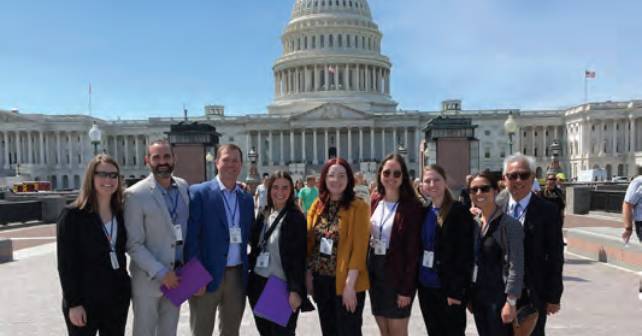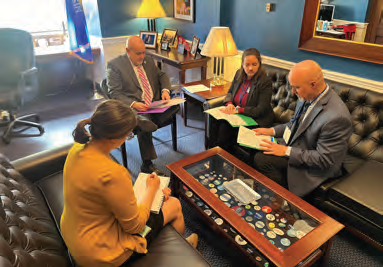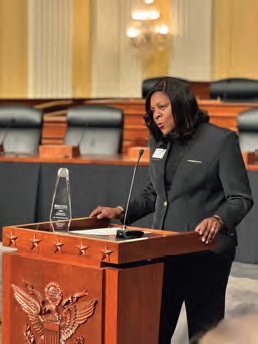
Leadership is defined as “the action of leading a group of people or an organization.” Advocacy is defined as “the act or process of supporting a cause or proposal.” Bringing those two concepts to life is what the 2024 ACEP Leadership and Advocacy Conference (LAC), themed “Stronger Together” and held April 14-16 in Washington, D.C., was all about. While it would be refreshing, and certainly easier, to advocate on “simple” issues, ACEP chooses to take on the tough issues and fights that improve the lives and practices of emergency physicians. And, in the spirit of both talking the talk and walking the walk, at LAC24, the College not only took on the difficult issues, but also the difficult conversations.
Explore This Issue
ACEP Now: Vol 43 – No 06 – June 2024
This year, there were 227 meetings on Capitol Hill.
By the numbers, the conference was another success. There were 433 attendees, including 157 attending for the first time, 64 emergency residents, and five medical students. Always the conference’s highlight, ACEP members participated in 227 Capitol Hill visits, including 53 visits with members of Congress. Each of these visits, whether with a member of Congress or their staff, is an opportunity to educate them on the issues and build relationships. In some ways, members of Congress and their staff are like emergency physicians. Just as we can be simultaneously caring for patients with an acute STEMI, ankle sprain, acute psychotic episode, and appendicitis, a member of Congress may vote on the same day for funding NASA, establishing climate law, passing a foreign aid package, and naming a post office. The point is that, just like us, they are required to know and act on a wide variety of issues. Members of Congress and their staff need trusted experts to provide insights and expertise on issues. That’s why developing a relationship of mutual trust with them is an essential part of our visits to Capitol Hill.

Texas emergency physicians met with their Senators, Representatives, and key staff members. Many of these ACEP members were making return visits to the annual LAC meeting. (Click to enlarge.)
This year, ACEP members took to the Hill to advocate on four issues: emergency department (ED) workplace violence, ED/hospital boarding, Medicare physician payment reform, and the need for fair due process laws to protect emergency physicians (see page 2 for a late-breaking update on this effort). The first day of this conference was packed with amazing educational presentations and enlightening conversations. Topical presentations and panel discussions by ACEP members on “Using Social and Traditional Media to Influence Congress,” “In Order to Form a More Perfect Union…ization?” “AI and Emergency Medicine,” “Stanley Cup, Space and Ski Slopes: New Practice Models Outside the ED,” and “Leading by Example: ACEP’s Model Legislation to Fight Scope Creep/Expansion,” all highlighted the College’s work to protect emergency physicians and advance the specialty of emergency medicine.
In a session titled, “A Conversation on Antitrust in Health Care,” Jonathan Kanter, JD, Assistant Attorney General of the Antitrust Division for the U.S. Department of Justice, spoke about the commitment of his department’s Health Care Task Force to ensuring that consolidation in health care doesn’t affect the care of patients delivered at the bedside. Mr. Kanter committed to continuing the work his office is already doing with the College to identify and address concerns of emergency physicians that the corporatization of health care delivery in physician groups, health care systems, and insurance companies has created an arms race of data driven to optimize profits rather than to improve the value of care delivered in the physician–patient relationship.
The second day of the conference began with one very difficult conversation prior to scheduled visits on Capitol Hill. Based on his support of ACEP and his lead role on several issues, including due process for emergency physicians, reform of the Medicare Physician Fee Schedule, and fair implementation of the No Surprises Act, ACEP had extended an invitation to Rep. Greg Murphy, MD (R-NC) to speak at the conference. While at the time of the invitation there was broad agreement on Rep. Murphy’s participation, the situation became complicated when Rep. Murphy introduced the Embracing anti-Discrimination, Unbiased Curricula, and Advancing Truth in Education (EDUCATE) Act to ban race-based mandates at medical schools and accrediting institutions. The EDUCATE Act would cut off federal funding to medical schools that force students or faculty to adopt specific beliefs, discriminate based on race or ethnicity, or have diversity, equity, and inclusion (DEI) offices or any functional equivalent. The bill would also require accreditation agencies to check that their standards do not promote these practices, while still allowing instruction about health issues tied to race or collecting data for research.
The introduction of the EDUCATE Act was met with clear and strong opposition by ACEP members, the College itself, and others within the House of Medicine. ACEP took the opportunity to publicly stand by our existing policy statement, “Workforce Diversity in Health Care Settings,” which was reaffirmed by the Board of Directors in June 2023.

ACEP President Aisha Terry, MD, FACEP, honored several lawmakers who have sponsored EM-friendly legislation.
ACEP heard from many members regarding Rep. Murphy’s invitation to speak at LAC; these included calls to uninvite him and discussions about a coordinated walkout by attendees. Led by ACEP President Aisha Terry, MD, MPH, FACEP, the College had multiple conversations with many members and listened to their concerns and thoughts. Rather than uninvite Rep. Murphy, ACEP took the approach of allowing Rep. Murphy to attend so that members could exchange our thoughts and perspectives with him. Dr. Terry led a professional and graceful discussion with Rep. Murphy. During the conversation, Rep. Murphy shared his perspectives on DEI initiatives within health care professional training; they are clearly not aligned with the College’s policy. Therefore, Dr. Terry educated Rep. Murphy about the numerous scientific studies that have demonstrated the value of having a diverse workforce and closed the session by sharing her personal perspective of having grown up, and still having family, in the very district Rep. Murphy represents.
Ultimately, allowing Rep. Murphy to participate in LAC was consistent with the College’s “walking the walk” of encouraging respectful listening and dialogue on difficult issues, even if we ultimately end up disagreeing. The College, just like our society, is composed of individuals with a wide variety of experiences, perspectives, and beliefs. One of the greatest challenges is listening to others, especially those with whom we disagree. Those who choose to live in an echo chamber are doomed to never learn or understand perspectives beyond those they currently know.
ACEP members likewise share a diversity of opinions on a number of issues. The College chooses to actively solicit and listen to the opinions of our members. Balancing the different perspectives of members on issues where there is no consensus is one of the greatest challenges for the College. When we discuss and consider issues that represent the diverse interests of our members, the College remains committed to the three core foundations upon which it was founded and which unify our members: ensuring our place as a unique specialty in the House of Medicine, advocating for emergency physicians, and advancing the care of patients.
If you want to be part of the incredible voice of emergency physicians that ACEP carries to Capitol Hill each year, then join us next year for LAC from April 27-29, 2025, in Washington, D.C.!
 Dr. Cirillo is a member of the ACEP Board of Directors.
Dr. Cirillo is a member of the ACEP Board of Directors.

 Dr. Goman is a board-certified emergency physician currently practicing in Ohio with US Acute Care Solutions.
Dr. Goman is a board-certified emergency physician currently practicing in Ohio with US Acute Care Solutions.



No Responses to “ACEP Leadership & Advocacy Conference 2024 Recap”